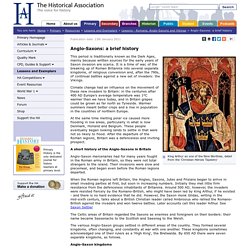

General Web Resources. Moderns. Victorians. Restoration. Romantics. Renaissance. Medival. Anglo - Saxons. Anglo-Saxon literature. Click anywhere inside the article to add text or insert superscripts, subscripts, and special characters.

You can also highlight a section and use the tools in this bar to modify existing content: We welcome suggested improvements to any of our articles. You can make it easier for us to review and, hopefully, publish your contribution by keeping a few points in mind: Encyclopaedia Britannica articles are written in a neutral, objective tone for a general audience. You may find it helpful to search within the site to see how similar or related subjects are covered.
Any text you add should be original, not copied from other sources. Alternative title: Old English literature Anglo-Saxon literature, Literature written in Old English c. 650–c. 1100. An Examination of Anglo-Saxon lyric poetry by Colleen Klees. The Old English, or Anglo-Saxon, era of England lasted from about 450-1066 A.D.
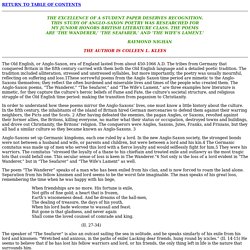
The tribes from Germany that conquered Britain in the fifth century carried with them both the Old English language and a detailed poetic tradition. The History of English - Old English (c. 500 - c.1100) About 400 Anglo-Saxon texts survive from this era, including many beautiful poems, telling tales of wild battles and heroic journeys.
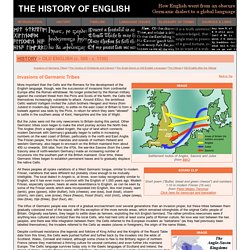
The oldest surviving text of Old English literature is “Cædmon's Hymn”, which was composed between 658 and 680, and the longest was the ongoing “Anglo-Saxon Chronicle”. But by far the best known is the long epic poem “Beowulf”. “Beowulf” may have been written any time between the 8th and the early 11th Century by an unknown author or authors, or, most likely, it was written in the 8th Century and then revised in the 10th or 11th Century.
It was probably originally written in Northumbria, although the single manuscript that has come down to us (which dates from around 1000) contains a bewildering mix of Northumbrian, West Saxon and Anglian dialects. The 3,182 lines of the work shows that Old English was already a fully developed poetic language by this time, with a particular emphasis on alliteration and percussive effects. HISTORY OF ENGLAND. Anglo-Saxon kingdoms: 5th - 9th century The various Germanic tribal groups invading Britain from the 5th century, and either subduing or displacing the Celtic inhabitants, have their own leaders who fight between themselves for supremacy in this new territory.
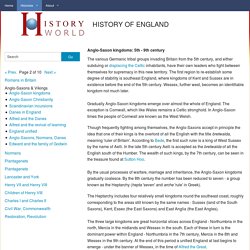
The first region to re-establish some degree of stability is southeast England, where kingdoms of Kent and Sussex are in existence before the end of the 5th century. Wessex, further west, becomes an identifiable kingdom not much later. Gradually Anglo-Saxon kingdoms emerge over almost the whole of England. The exception is Cornwall, which like Wales remains a Celtic stronghold. Anglo-Saxon Culture. Michael Delahoyde Washington State University History: When Rome was weakening early in the fifth century c.e., troops in the outlying regions, including the British Isles, were withdrawn.
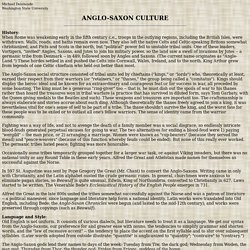
Walls, roads, and baths remain even now. They also left the native Celts and Celtic-speaking Britons somewhat christianized, and Picts and Scots in the north, but "political" power fell to unstable tribal units. One of these leaders, Vortigern, "invited" Angles, Saxons, and Jutes to join his military power, so the land saw a swell of invasions by Jutes -- a germanic tribe from Denmark -- in 449, followed soon by Angles and Saxons. (The current name originates as "Angle-Land. ") The Anglo-Saxon social structure consisted of tribal units led by chieftains ("kings," or "lords") who, theoretically at least, earned their respect from their warriors (or "retainers," or "thanes," the group being called a "comitatus").
In 597 St. Language and Style: Old English is not uniform. Works Consulted Mursell, Gordon. Anglo-Saxon Culture. The Anglo-Saxons were Germanic barbarians who invaded Britain and took over large parts of the island in the centuries following the withdrawal of the Roman Empire.
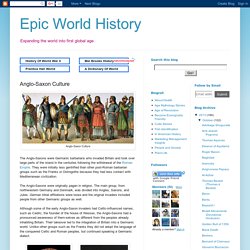
They were initially less gentrified than other post-Roman barbarian groups such as the Franks or Ostrogoths because they had less contact with Mediterranean civilization. Anglo-Saxons: a brief history. Publication date: 13th January 2011 King Arthur as one of the Nine Worthies, detail from the 'Christian Heroes Tapestry' This period is traditionally known as the Dark Ages, mainly because written sources for the early years of Saxon invasion are scarce.
